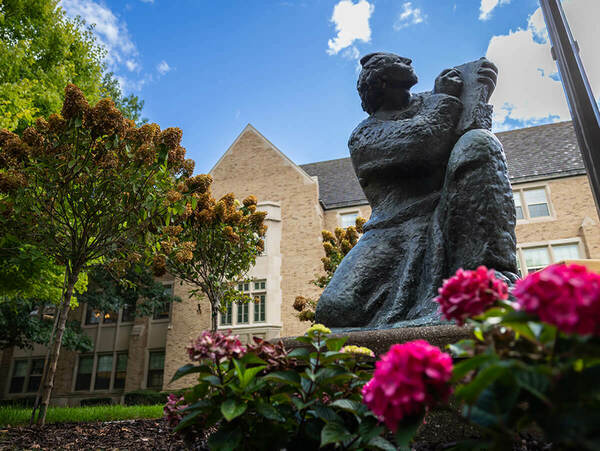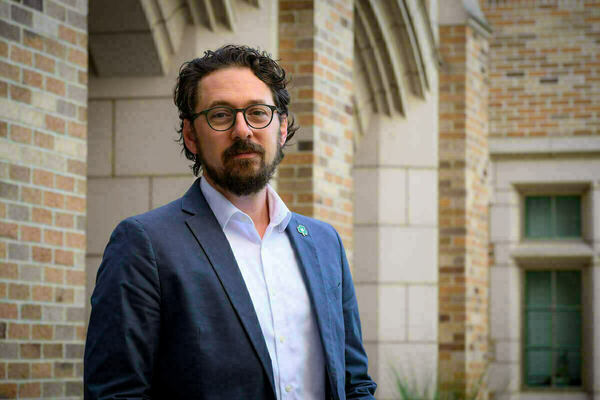Four faculty teams awarded 2025 Poverty Research Packages
The Notre Dame Poverty Initiative has announced a new round of multi-year investments that will support high-impact, poverty-related research projects led by Notre Dame faculty in multiple disciplines.
The Initiative’s second annual call for proposals drew a strong response, with 18 submissions from faculty representing 13 different departments, centers, and institutes across campus. From this highly competitive applicant pool, four projects were selected for 2025 Poverty Research Package funding.
These four projects will join three awarded in 2024, totalling seven teams representing five colleges across Notre Dame — the College of Arts & Letters, the College of Engineering, the Keough School of Global Affairs, the Mendoza College of Business, and the College of Science.
“The challenges that poverty presents are many and varied,” said Jim Sullivan, director of the Notre Dame Poverty Initiative and professor of economics. “It takes diverse approaches and a robust range of research methodologies to tackle it. The Poverty Initiative is proud to support some of the University’s brightest minds in their examinations of what causes poverty and how to end it.”
2025 Awardees and Research Projects

Frank Germann, a professor of marketing and chair of the Department of Marketing, is leading a randomized, controlled trial that explores the potential of large language models to provide scalable, AI-driven mentorship for entrepreneurs in emerging markets. Germann’s research focuses on Kampala, Uganda, and will be supported by co-principal investigator Fr. Arthur Ssembajja, a Research Visitor at Notre Dame and a Ph.D. candidate in Economics at the University of Tübingen (Germany).

Rev. Stephen Koeth, C.S.C., an assistant professor in the Department of History, is conducting archival research to develop a monograph examining the crucial, often-overlooked contributions of American Catholics to the development of public and affordable housing in the United States over the past century.

Laura Miller-Graff, a professor of in the Department of Psychology and director of the William J. Shaw Center for Children and Families, and Kristin Valentino, a professor of psychology and director of the Veldman Family Psychology Clinic, will co-lead a project that integrates multiple types of longitudinal data collection into an ongoing study of the effects of housing instability on child maltreatment and intimate partner violence.

Fanny Ye, Galassi Family Collegiate Professor in the Department of Computer Science and Engineering, will lead a research project that will harness large-scale, multi-source, multi-modality data to develop an AI-augmented paradigm to examine the intersection of poverty-driven food insecurity and the opioid crisis. The project will also develop integrated interventions tailored to individuals facing these intertwined challenges. Ye will be joined by co-principal investigator, Nitesh Chawla, Frank M. Freimann Professor of Computer Science and Engineering and founding director of the Lucy Family Institute for Data and Society.
“I appreciate the recognition of our proposal, especially given the high caliber of submissions and the competitive nature of the selection process,” Ye said. “It is incredibly encouraging to have this level of support for the work, and I’m very excited to move it forward with the help of the Poverty Research Package.”
Faculty and staff with questions about the annual Poverty Research Package funding opportunity or other ways to partner with the Poverty Initiative can contact Assistant Director Fred LaBrecque at flabrec2@nd.edu.
Originally published by at strategicframework.nd.edu on August 13, 2025.
Latest Research
- ND research teams awarded funding to address sustainability challenges around the worldNotre Dame's Just Transformations to Sustainability Initiative has awarded funding to three cross-disciplinary faculty teams leading research on pressing sustainability issues—including forest conservation in the Amazon, watershed…
- Fighting to improve hurricane forecastsResearchers at Notre Dame are improving hurricane forecast accuracy, giving officials time to evacuate and protect residents. Read the article
- 2025 Naughton Fellowships awarded to four joint faculty projectsThe University of Notre Dame’s Naughton Fellowship program has announced its faculty awardees for the 2025-2026 cohort. Faculty from leading Irish universities and Notre Dame have come together to work on four research projects as a part of the Naughton Faculty…
- Notre Dame Law School Welcomes Four New Clinical Faculty Members for 2025–26Notre Dame Law School is pleased to welcome four new clinical faculty members for the 2025–26 academic year. “It is an honor to welcome such a distinguished group of clinical professors to Notre Dame Law School. Their impressive achievements and deep sense of vocation will enrich our academic…
- Six early-career scholars join the inaugural Provost’s Postdoctoral Fellowship Program.Six interdisciplinary scholars have joined the College of Arts & Letters at the University of Notre Dame to continue their research, obtain invaluable support, and engage in professional development as part of the inaugural Provost’s…
- Politics inspired Democracy Initiative managing director from early ageThis is the first in a series of features highlighting the managing directors of the University's strategic initiatives. The managing directors are key (senior) staff members who work directly with the faculty directors to help implement and operationalize the vision for the initiatives, oversee initiative staff, and serve as thought partners for the faculty directors.











